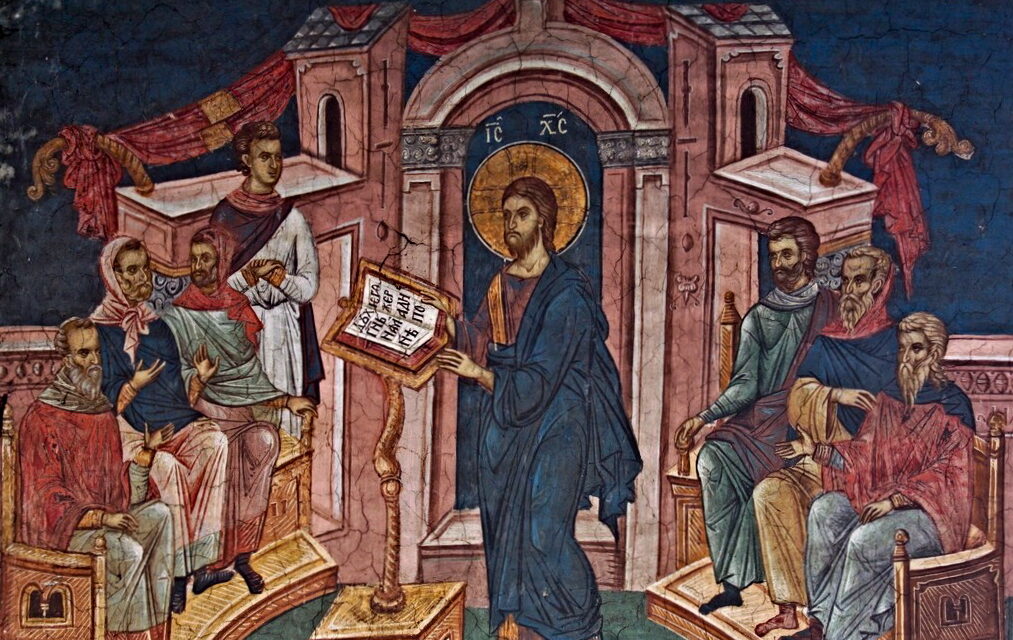There’s an interesting story in the Gospel According to Luke. In Chapter 4, after Jesus is done fasting in the desert for 40 days and 40 nights and being tempted by the devil, he returns to his hometown of Nazareth. On the Sabbath, he attends the synagogue and is invited to speak.
He stood up to read, and the scroll of the prophet Isaiah was given to him. He unrolled the scroll and found the place where it was written: ‘The Spirit of the Lord is upon me, because he has anointed me to bring good news to the poor. He has sent me to proclaim release to the captives and recovery of sight to the blind, to let the oppressed go free, to proclaim the year of the Lord’s favour.’
Then he rolled up the scroll, gave it back to the attendant and sat down. The eyes of everyone in the synagogue were fastened on him. He began by saying to them, “Today this scripture is fulfilled in your hearing.”
All spoke well of him and were amazed at the gracious words that came from his lips. “Isn’t this Joseph’s son?” they asked.
At this point, he added a brief bit of commentary.
“Truly I tell you,” he continued, “no prophet is accepted in his hometown. I assure you that there were many widows in Israel in Elijah’s time, when the sky was shut for three and a half years and there was a severe famine throughout the land. Yet Elijah was not sent to any of them, but to a widow in Zarephath in the region of Sidon. And there were many in Israel with leprosy in the time of Elisha the prophet, yet not one of them was cleansed—only Naaman the Syrian.”
Now, to me, it’s pretty significant to know the scripture Jesus decided to read in his hometown synagogue and how he interpreted it. Of course, I have no idea if this story is true, but if you believe in the accuracy of the Gospels, this is a key piece of information about Jesus’s belief system. He saw himself as the fulfillment of Isaiah’s prophesy to bring relief to the sick, poor and oppressed but anticipated that those who knew him best from his childhood would be skeptical. When he used examples from the Book of Kings I and II to drive home the point, the congregation became enraged:
All the people in the synagogue were furious when they heard this.They got up, drove him out of the town, and took him to the brow of the hill on which the town was built, in order to throw him off the cliff. But he walked right through the crowd and went on his way.
One moment they were speaking well of him and the next moment they formed a lynch mob. Touchy crowd.
This episode from the Gospel of Luke is far from the only example of Jesus advocating for the poor and unfortunate, and of course we know how the story ends, on the cross. His message was rejected in his lifetime, so how much more would we expect it to be rejected today?
But a lot of Christians try to follow Jesus’s example, which is also to be expected. In Austin, Texas, the Sunrise Community Church is known as a homelessness ministry and receives generous funding from the city council for this purpose.
Sunrise Community Church, which is part of the Reformed Church in America, a generally liberal denomination within the Protestant faith, has described the Sunrise Homeless Navigation Center as the largest provider of homelessness services in Travis County. The center, founded in 2015, provides meals, showers and computer access to people experiencing homelessness, per reporting by the Austin American-Statesman’s Skye Seipp. The church claims to have helped more than 4,275 people move into housing through the ministry.
The attorney general of Texas, Ken Paxton, has decided to initiate a lawsuit to shut this ministry down. As part of this, he’s made a list of horribles:
“Sunrise homeless clients break into residents’ homes,” the suit states. “They menace residents with machetes. They routinely urinate and defecate in the streets. They masturbate in public, while trying to grab passing women. They wake up residents with high-pitched screams in the middle of the night.” It also says that the church ministry’s “depravity is a great deal worse” because it exists near Joslin Elementary School.
Now I don’t know if all these allegations are true. But it’s fair to say that the homeless in 1st-Century Nazareth and Jerusalem had a lot in common with the homeless in 21st-Century Austin, Texas. They were prone to mental illness. They urinated, defecated and masturbated in public. They made loud noises that disturbed people’s slumber. Alcoholism and other forms of substance abuse were the cause of many a downfall then, just as now. It wasn’t any easier to overlook these things in Jesus’s time. It has always been easier and safer to avoid the destitute and the mentally ill than to engage with and try to help them.
If there had been a synagogue in Nazareth back then dedicated to feeding, housing and finding employment for the homeless, it would have inevitably received the same kinds of complaints that the Sunrise Community Church receives today.
That doesn’t mean that the Sunrise Community Church should be indifferent to those complaints, but they aren’t.
Mark Hilbelink, the pastor at Sunrise Community Church and executive director of its homelessness ministry, declined to comment this week. But he acknowledged the suit in a previous news release, saying it’s “regrettable” that Paxton took legal action, especially during Thanksgiving week. “Sunrise intends to keep offering services to people in our community who need them,” Hilbelink said in a statement Tuesday. “We are committed to being a good neighbor. We will continue to work, every day, to support Joslin Elementary School, our neighborhood, and our entire community.”
Whether you are Christian or not, it’s easy to see that this pastor and this congregation are doing something central to Jesus’s message. It’s not easy work. It’s not popular work. One day they might receive praise from the community and the next a lynch mob could form to run them out of town or throw them off the brow of a hill.
The truth is, the attorney general of Texas doesn’t like these Christians because they don’t give him their political support. Perhaps, deep down, he hates them also for shaming him with their example of true compassion and empathy in the name of Christ, their Lord.
Ken Paxton shows why perhaps no true church is ever accepted in its home town.






